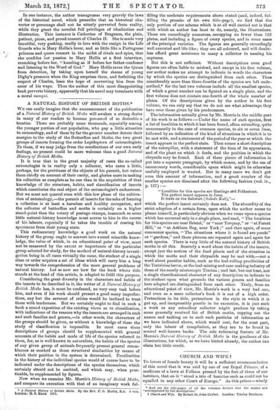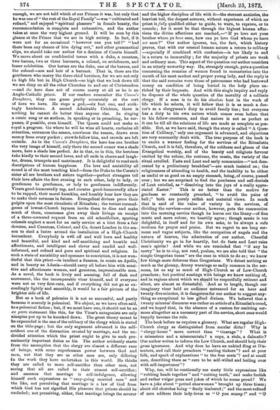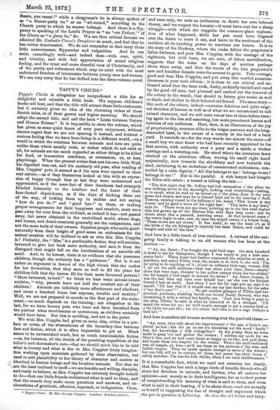CHURCH AND WIFEf
To lovers of female beauty it will be a sufficient recommendation of this novel that it was said by one of our Royal Princes, of a modicum of a lawn at Fulham pressed by the feet of three of our heroines, that on it "stood a trio of beauties such as could not be equalled in any other Court of Europe." As this prince—wisely
• And yet the title-pages of all the volumes declare that the names are "accompanied by full descriptions." i• Church and wife. By Robert St. John Corbel,. London: Tinsley Brothers. enough, we are not told which of our Princes it was, but only that he was one of" the rest of the Royal Family"—was" cultivated and refined," and enjoyed "spiritual pleasure" in female beauty, the recommendation is complete and exhaustive, and the author takes at once the very highest ground. It will be seen by this glance at the Prince that we are in high society. In fact, if it were not for an occasional "however can you tell?" "had there been any chance of him dying out," and other grammatical slips, we should take our author for a denizen of Courts himself. We move about on confidential terms with a duke, a countess, two barons, two or three baronets, a colonel, an archdeacon, and lesser celebrities. Our heroes are the duke, one of the barons, and the colonel—son and heir of a baronet. That is, these are the gentlemen who marry the three chief heroines, for we are not only in high life but in High Church—so high that we look down till we are dizzy on all the other Churches in and out of Christendom —and the hero does not of course marry at all as he is an Anglo-Catholic priest. If our readers remember the Canon's Daughters, they can guess pretty accurately at the sort of hero we have. He steps a god,—six feet one, and strik- ingly handsome. A second Admirable Crichton, there is nothing he cannot do better than anyone else. In singing a comic song or an anthem, in speaking or in preaching, he sur- passes, if possible, even himself. The Queen could not make so royal a progress. Go where he will he wins all hearts, enchains all attention, entrances the senses, convinces the reason, draws even money from every pocket ; crowds follow him, and crowds are left outside. As in the Canon's Daughters, the hero has one brother the very image of himself, only there the second corner was a shade snore, here a shade less perfect. As in that, so in this, the heroines take kindly to their second loves, and all ends in cheers and laugh- ter, drums, trumpets and matrimony. It is delightful to read such descriptions of human happiness. The love and amiability all round is of the most touching kind—from the Duke to the Curate's sister all are brothers and sisters together—perfect strangers tell their love affairs the first evening to each other, lady to lady, or gentleman to gentleman, or lady to gentleman indifferently. Vicars good-humouredly rap, and curates good-humouredly allow to be rapped, their moral knuckles, and humbly hear how they are to make their sermons in future. Evangelical divines press their pulpits upon the most ritualistic of Ritualists ; the veriest curmud- geons of lowest-Church laymen invite them to dine and make much of them, countesses give away their livings on receipt of a three-cornered request from an old schoolfellow, sporting colonels neglect a meet for an early service at a hint from a fair devotee, and Countess, Colonel, and Co. desert London in the sea- son to shed a lustre around the installation of a High-Church incumbent. Everybody is well off and well born and healthy and beautiful, and kind and self-sacrificing and humble and affectionate, and intelligent and clever and candid and well- informed, and refined and pure and spiritual and religious. In such a state of amiability and openness to conviction, it is not won- derful that this priest—in intellect a Samson, in music an Apollo, and in beauty an Adonis—should carry all before him with sensi- tive and affectionate women, and generous, impressionable men. As a novel, the book is lively and amusing, full of dash and movement, like the incomparable vicar himself, and if everyone were not so very first-rate, and if everything did not go so ex- ceedingly lightly and smoothly, it would be a fair picture of the brighter side of life.
But as a book of polemics it is not so successful, and partly because it scarcely is polemical. We object, as we have often said, to a polemical fiction; but, if we must have one, it should not be an ex parte statement like this, for the Vicar's antagonists are only ninepins put up to be knocked down. The great theory meant to be expounded is the one of the celibacy of the clergy which is stated on the title-page ; but the only argument advanced is the self- evident one of the distraction created by marriage, and the un- divided attention which the priest ought to give to such pre- eminently important duties as his. The author evidently starts from the assumption that the clergy are almost a different race -of beings, with some superhuman power between God and men, not that they are as other men are, only differing in the work they have undertaken in this world. He thinks they are called to more self-sacrifice than other men, not seeing that all are called to their utmost self-sacrifice ; -and assumes that marriage is self-indulgence, allowing himself such expressions as "easy-going married men" and the like, not perceiving that marriage is a law of God from which God has not signified His pleasure that priests should be excluded ; not perceiving, either, that marriage brings the severer I and the higher discipline of life with it—the sternest anxieties, the heaviest toil, the deepest sorrows, without experience of which no priest is fully qualified either to guide, to warn, to reprove, or to console ; for it must be that through the highest human affec- tions the divine affections are reached,—" If ye love not your brother whom ye hare seen, how can ye love God whom ye have not seen?" Our author ignores, too, the fact, which history proves, that with our sensual human nature a return to celibacy —especially if combined with confession—is too likely to end in a return to immorality ; for the majority of priests are weak and ordinary men. This aspect of the question our author considers in an utterly unworthy way. He, strangely enough, puts a question concerning the remains of women found in monasteries into the mouth of his most modest and proper young lady, and the reply is that the said remains were those of patronesses who had bestowed money on condition of being buried in the holy place en- riched by their bequests. And with this single inquiry and reply he disposes of the whole question of the morality of a celibate clergy. If a man is to do his absolute best in the work of life which he selects, it will follow that it is as much a doc- tor's as a clergyman's duty to avoid family ties ; but everyone has a duty to his own nature which comes even before that to his fellow-creatures, and that nature is not as perfect as it can be till all the relations of life are made as complete as pos- sible. But, as we have said, though the story is called "A Ques- tion of Celibacy," only one argument is advanced, and objections are very summarily dealt with. The true purpose of the book is to excite a warmer feeling for the services of the Ritualistic Church, and it is full, therefore, of the coldness and gloom of the Evangelical worship, and of the beauty and religious fervour excited by the colour, the costume, the music, the variety of the ritual extolled. Fasts and Lent and early communion—" not dese- crated by a preliminary breakfast"—are much insisted on ; the religiousness of attending to health, and the inability to be either as useful or as good on an empty stomach, being, of course, passed over ; but we are surprised to find the penitence and self-denials of Lent extolled, as "dissolving into the joys of a really appre- ciated Easter." This is no better than the motive for goodness so constantly preached, "to avoid the pains of hell ;" both are purely selfish and material views. In much that is said of the value of variety in the services, of dividing the services—our author, however, puts the communion into the morning service though he leaves out the litany—of fine music and more colour, we heartily agree ; though music is too delightful, in itself and for its own sake, to be always a safe medium for prayer and praise. But we regret to see long ser- mons and vague subjects, like the occupation of angels and the nature of heaven, the admiration of our author. Cheerful Christianity we go in for heartily, but do fasts and Lent raise men's spirits? And while we are reminded that "if any be merry" he is to sing, not read, psalms, we are also told that "the simple Gregorian tunes" are the ones in which to do so ; we know few things more dolorous than Gregorians. We detest nothing so much as the gloomy, dreary warnings so sadly common in the ser- mons, let us say as much of High-Church as of Low-Church preachers ; but poetical soarings with beings we know nothing of, and in regions about which we should be respectfully reticent and silent, are almost as distasteful. And as to length, though our imaginary vicar held an audience entranced for an hour and twenty-five minutes, it is dangerous for our author to suggest any- thing so exceptional to less gifted divines. We believed that a twenty minutes' discourse was rather an article of a Ritualist's creed, and we hoped that, in the absence of a custom for omitting ser- mons altogether as a necessary part of the service, short ones would happily become the rule.
The book before us requires a glossary. What are regular High- Church clergy as distinguished from secular ditto ? Why is "clergy-house " more correct than " vicarage" ? What is a missasicca and a missacantata? a cope, a stole, a dalmatic? Our author writes to inform the Low Church, and should help their gross ignorance. And why does he have an unkind fling at Dis- senters, and call their preachers "ranting tinkers"? and at poor folk, and speak of explanations "to the free seats"? and at small men, describing them as "sure to be self-willed and boiling over with self-importance" ?
Why, too, will he continually use nasty little expressions like "rubbing heads together" and "cutting teeth," and make foolish and rather vulgar puns and jukes of which he seems proud? We have a joke about "potted charwoman" brought up three times; about old churches being "finely timbered ;" and the most refined of men address their lady-loves as "0 you scamp !" and "0
Bessie, you rascal !" while a clergyman's tie is always spoken of as "a dinner-party tie" or an "au-round," according to the Church party to which its wearer belongs. And there is a flip- pancy in speaking of the Lord's Prayer as "an our Father," of the Gloria as "a glory be," &c. We are thus critical because we admired Mr. Corbet's Canon's Daughters so much, and feel that he has rather deteriorated. We do not remember in that story these
little narrownesses, flippancies and vulgarities. And he can write exceedingly well—and indeed does—with ease, spirit, and vivacity, and with full appreciation of sound religious feeling, and the truer and more cheerful view of Christianity, and of the purity and refinement which may co-exist with the most unfettered freedom of intercourse between young men and women. We are very sorry that he has drifted into the three-volume novel.




































 Previous page
Previous page